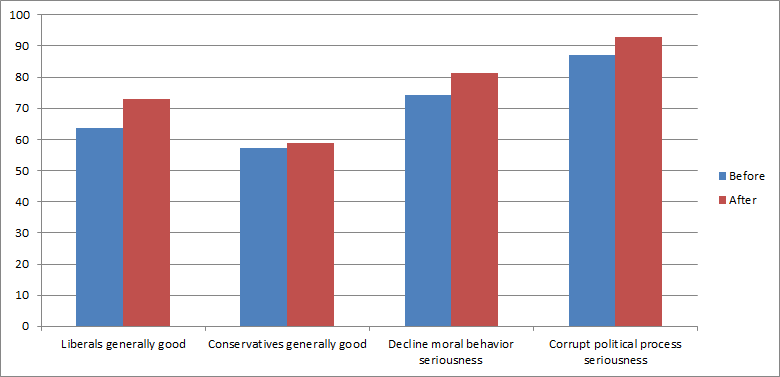The Village Square helps partisans recognize common threats
One of the more robust findings in social psychology is the idea that common goals reduce inter-group conflicts. Several groups have recently taken this finding into the field, using Jonathan Haidt’s Asteroids Club model, including a dinner we co-hosted with the Nathan Cummings Foundation. The group that has done the most with this concept is undoubtedly the Village Square, an organization that has put together a series of dinners where liberals learn about conservative concerns, and conservatives learn about liberal concerns, with the idea that people can come together, over food, to learn about issues that everyone should be concerned about.
Part of Civil Politics mission is to examine how research is used in practice and so we recently partnered with the Village Square to survey participants of a recent dinner where liberals learned about conservative concerns about the decline of individual moral behavior and conservatives learned about liberal concerns about moral corruption in politics (also see coverage in the Tallahassee Democrat). We asked participants in the survey to agree or disagree with the following statements:
- Liberals are generally good people.
- Conservatives are generally good people
- The decline of individual moral behavior is a serious issue that we should work together to correct.
- The moral corruption of our political process through the influence of money is a serious issue that we should work together to correct.
The first thing we learned is that it is really hard to get people to answer survey questions with no payoff or incentive, and so only 10% of the approximately 150 people who attended completed the surveys. As a result, the differences below are not statistically significant and consumers of traditional statistics would say that there is no difference. A Bayesian approach (that I subscribe to) would say that this is relatively weak evidence. With that caveat in mind, below are the survey results.
It appears there were slight benefits as to how liberals and conservatives were perceived by the audience, with both groups being perceived as slightly more good. However, the most important result is the last 2 bars, where, even in a case where participants already perceived the dual “asteroids” as serious, the event appears to have spurred some participants to take these threats even more seriously. Research would indicate that forging a common bond should indeed lead to the possibility of greater inter-group cooperation.
That being said, this is indeed weak statistical evidence, given the small sample size and should be contextualized within the results of other Asteroid’s Club results. Hopefully going forward, we’ll start to see a consistent pattern amongst events, such that sum of such weak evidence, combined with the results of lab studies, tells a consistent story. If your organization is doing conflict resolution work (any conflict between groups will do, not just in the realm of politics) and would like to be part of that story, please do contact us and we would be happy to setup a similar survey for your event, to see if it does indeed bring people together, as well as to contribute ideas from our research.
– Ravi Iyer


